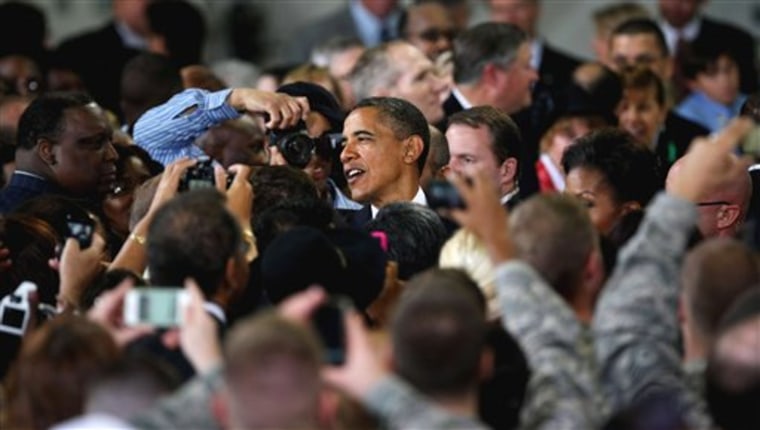Congress will almost certainly approve the parts of President Barack Obama's jobs bill that extend the payroll tax cut and long-term unemployment benefits. But his calls for new spending and a surtax on millionaires seem doomed.
It's a legislative reality largely missing in the furious political debate now unfolding along all-or-nothing lines, in which Obama tries to assign Republicans part of the blame for a dismayingly weak economy while the GOP tries to avoid it.
"Last week, all the Republicans in the Senate got together and blocked the jobs bill," the president said this week after his bus rolled, campaign-style, into Millers Creek, N.C. "They refused to even debate it."
He cited a poll that said about 63 percent of Americans "support the ideas in this jobs bill," then he asked, "So why is it that 100 percent of Republicans in the Senate voted against it?" He added, "It doesn't make any sense."
The morning after, Senate Republican Leader Mitch McConnell rebutted.
"He's trying to change the topic," the Kentucky senator said of Obama. "He wants to deflect attention from that 1.5 million job loss" since he took office. "For two years, the president got everything he wanted from the Democrats in Congress," McConnell added.
In the political argument, both sides play loose with the facts.
Despite Obama's rhetoric, it was Senate Democrats who forced a rewrite of the jobs bill last week. And even now, it's unlikely he has enough support within his own party to assure a majority.
And despite McConnell's claim, Obama settled for less than he wanted from Congress in an economic stimulus bill early in 2009, agreeing to a concession in exchange for Republican votes critical to passage.
Political debate aside, significant parts of the legislation seem on track to pass by year's end, when payroll tax cuts enacted a year ago and unemployment benefits are scheduled to expire.
The proposed renewal of the payroll tax cut, at $179 billion over a decade, is the largest single item in the legislation and has drawn no significant opposition from Republicans.
A proposal to give employers a break on payroll taxes, a $69 billion provision, could pass, as well.
An extension of unemployment insurance, likely to pass, carries a price tag of $48.5 billion.
Far less likely to become law, given Republican opposition, are the president's requests for $50 billion over a decade for transportation projects, $35 billion to help the states hire teachers and first responders, $30 billion for school modernization and $15 billion for a neighborhood stabilization fund.
Nor do Republicans show any interest in accepting the millionaires' surtax that would pay the entire cost of the measure.
The parts that draw bipartisan support and the parts that do not all generate significant support in public opinion polls. That explains why Democrats maneuver constantly to force Republicans to vote on them, requiring them to choose between what is politically popular on the one hand, and their aversion to tax increases and higher federal spending on the other.
As an example, 75 percent of the public support the use of federal funds to let states hire teachers and first responders, according to a CNN/ORC survey released Tuesday and cited instantly by Democrats.
Yet there is ample polling that shows the country is suspicious of more spending and larger government. In the survey that Democrats cited, a 59-36 majority said the president's policies are more likely to fail than to succeed.
While the legislative maneuvering grinds on, Obama travels widely, sometimes aboard Air Force One and occasionally along roads that lead to towns rarely visited by presidents.
With the exception of Texas, his itinerary consists of states he won in 2008. In all cases, unemployment is higher than when he took office.
North Carolina, where the president spoke on Monday, had joblessness of 10.4 percent in August, according to the Bureau of Labor Statistics, up from 9.7 percent in January 2009.
Virginia, where the president had two speeches on Tuesday, had unemployment of 6 percent when Obama took office, 6.3 percent in August.
The other states include Pennsylvania: unemployment at 7 percent in January, 2009 but 8.2 percent now. Ohio: 8.8 percent then, 9.1 percent now. Colorado, 6.6 percent then, 8.5 percent now; Washington, 7.8 percent then, 9.3 percent now; California 10.1 percent then, 12.1 percent now and Florida, 8.6 percent then and 10.7 percent now.
Confronting numbers like that, Obama on Tuesday offered what he called a comparison.
Republicans, he said, "want to gut environmental regulations. They want to roll back Wall Street reform so that we end up with the same financial system we had that got us into this mess in the first place. And they want to repeal health care reform so that 30 million people won't have health insurance.
"That is what they call their 'Real American Jobs Act.' It's inspiring stuff," he taunted.
Not at all, of course, which is why McConnell insisted otherwise.
" The president I think has become convinced that the economy is not likely to be much better a year from now. So he has started the campaign 13 months early, and he's trying to convince the American people that it's anybody else's fault but his."
